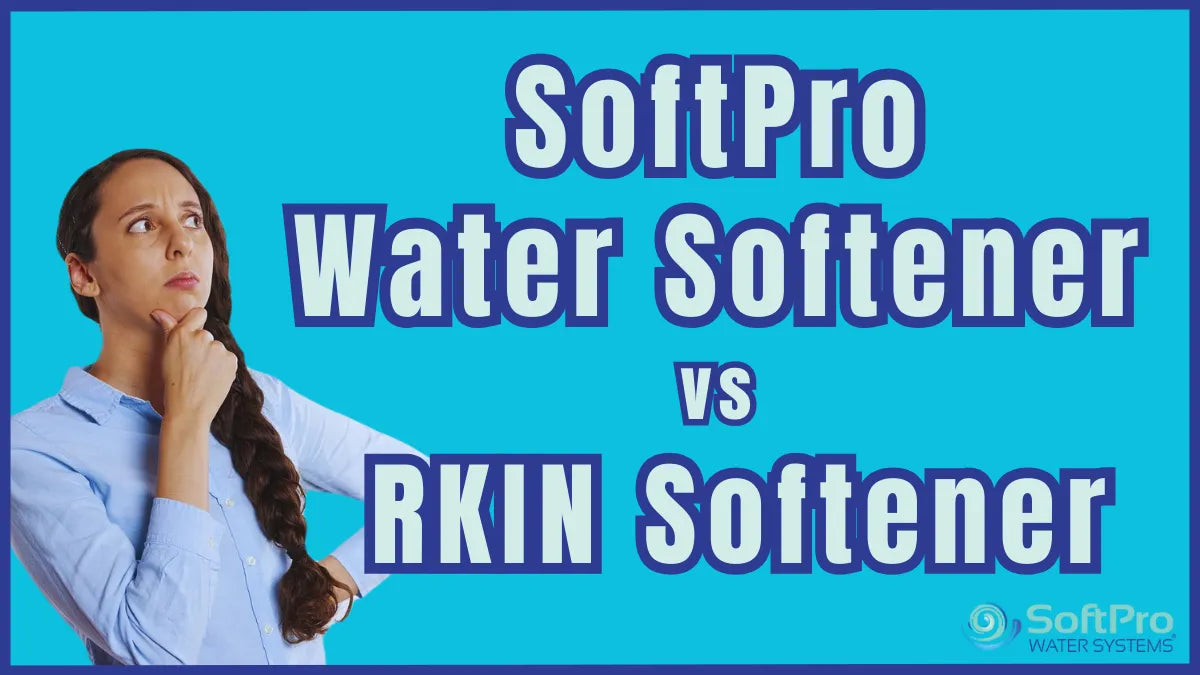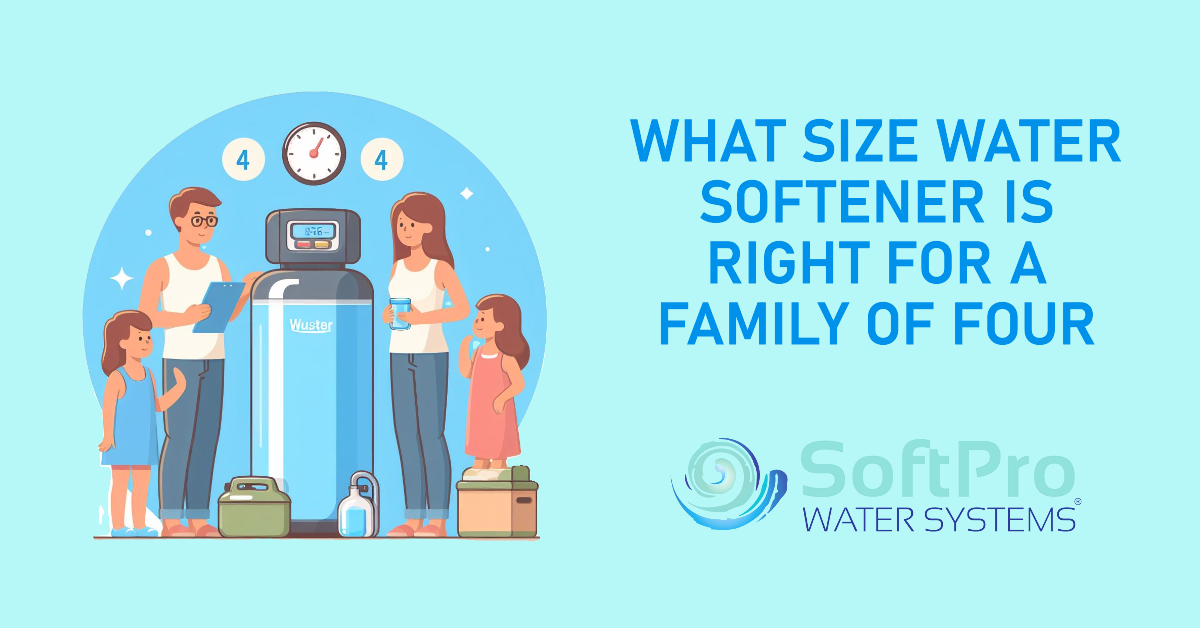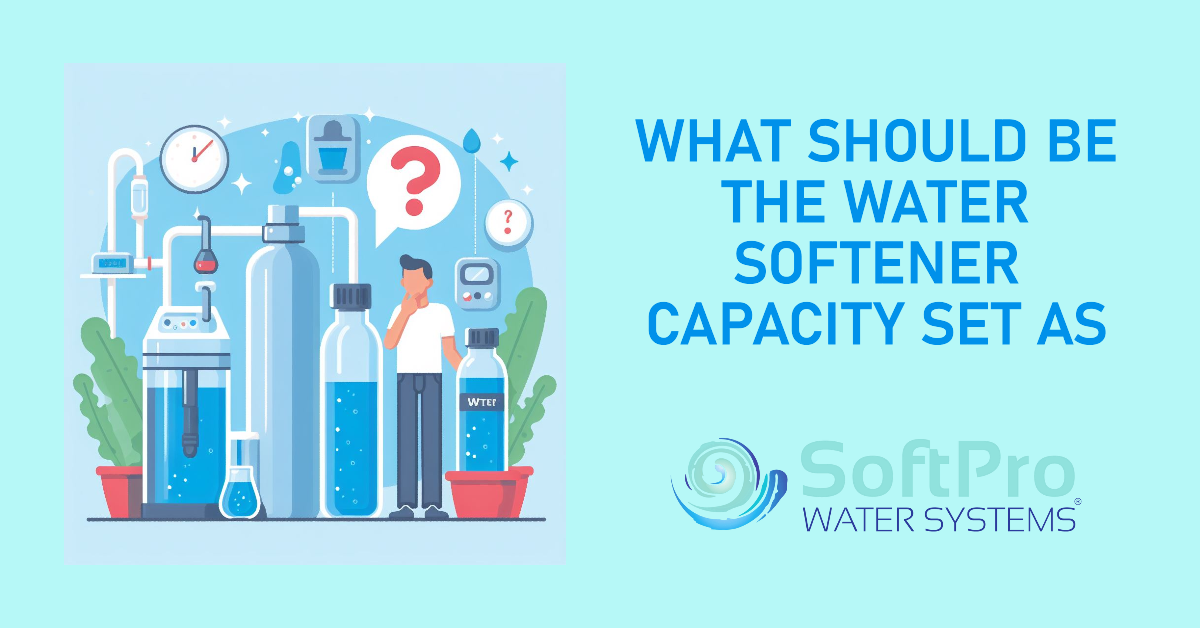SoftPro vs RKIN: Performance, Efficiency, Features, Installation, Cost Comparison
Table of Contents
Understanding Hard Water and Water Softening
What is hard water and why is it a problem?
Hard water is water with a high mineral content, primarily calcium and magnesium. These minerals, while not harmful to humans, can cause several problems in your home:
- Scale buildup: Hard water minerals can leave behind a white, chalky residue on surfaces like faucets, shower doors, and appliances. This can be difficult to remove and can damage your fixtures over time.
- Reduced cleaning effectiveness: Soaps and detergents don't lather as well in hard water, making it harder to clean dishes, laundry, and your hands effectively.
- Appliance malfunctions: The buildup of minerals can clog and damage appliances like dishwashers, washing machines, and water heaters, leading to reduced efficiency and higher repair costs.
How do I know if I have hard water?
There are several signs that you might have hard water:
- Soap scum: If soap scum forms quickly on your hands, dishes, or shower walls, it's a good indication of hard water.
- Dry skin and hair: Hard water can strip natural oils from your skin and hair, leaving them feeling dry and irritated.
- Faded clothes: Hard water can cause clothes to fade and become stiff over time.
- White mineral deposits: If you see white, chalky deposits around your faucets or on appliances, it's a clear sign of hard water.
What are the problems caused by hard water?
In addition to the aesthetic and cleaning issues mentioned above, hard water can also lead to:
- Increased energy bills: Water heaters need to work harder to heat hard water, leading to higher energy consumption.
- Reduced water pressure: Mineral buildup can clog pipes and reduce water flow throughout your home.
- Shortened appliance lifespan: The buildup of minerals can damage appliances and shorten their lifespan.
How do water softeners work?
Water softeners remove the hardness minerals from your water using a process called ion exchange. Here's how it works:
- Hard water passes through a tank filled with resin beads coated with sodium ions.
- The calcium and magnesium ions in the water attach themselves to the resin beads, displacing the sodium ions.
- The softened water, now free of hardness minerals, exits the tank and flows to your home.
- Periodically, the softener needs to be regenerated. This involves flushing the tank with a saltwater solution to remove the accumulated calcium and magnesium ions and recharge the resin beads with sodium.
Introducing SoftPro and RKIN Water Softeners
Now that you understand the challenges of hard water and how water softeners work, let's delve into two popular brands: SoftPro and RKIN. Both offer a range of models to address different water hardness levels and home needs, but they have distinct features and strengths.
SoftPro Water Softener Overview
SoftPro water softeners are known for their:
- High grain capacity: SoftPro models offer some of the highest grain capacities in the industry, meaning they can remove a significant amount of hardness minerals before needing regeneration. This translates to longer periods of soft water and less frequent maintenance.
- Efficiency: SoftPro utilizes advanced technology like dual-tank systems and variable-speed motors to optimize water and salt usage, potentially reducing your operating costs.
- Digital controls and user-friendliness: Many SoftPro models feature intuitive digital displays and user-friendly interfaces, making it easy to monitor performance and adjust settings.
- Warranty: SoftPro offers generous warranties for its water softeners, providing peace of mind and confidence in your investment.
However, some user reviews mention:
- Higher upfront cost: SoftPro models might be priced slightly higher than some competitors.
- Limited noise reduction features: Some users report that certain SoftPro models can be noisy during regeneration cycles.
RKIN Water Softener Overview
RKIN water softeners are known for their:
- Affordability: RKIN models are generally less expensive than SoftPro softeners, making them a budget-friendly option.
- Compact design: RKIN offers space-saving models that are ideal for smaller homes or limited installation space.
- Quiet operation: Many RKIN models feature advanced noise-reduction technology, making them a good choice for noise-sensitive areas.
- Easy installation: Some RKIN models are designed for DIY installation, potentially saving you money on professional installation costs.
However, some user reviews mention:
- Lower grain capacity: RKIN models generally have lower grain capacities compared to SoftPro, meaning they may require more frequent regeneration and potentially higher salt consumption.
- Simpler controls: While user-friendly, some RKIN models may lack the advanced features and customization options found in some SoftPro models.
- Limited warranty: RKIN warranties tend to be shorter than SoftPro's warranties, potentially impacting long-term value and peace of mind.
Head-to-Head Comparison: Performance and Efficiency
With an understanding of each brand's strengths and weaknesses, let's dive deeper into a head-to-head comparison of their performance and efficiency in key areas:
Hardness Removal
- Grain Capacity: As mentioned, SoftPro generally boasts higher grain capacities, allowing them to remove more hardness minerals between regenerations. This translates to potentially longer periods of soft water and less frequent salt usage. RKIN, while offering some high-capacity models, tends to fall behind in average capacity.
- Regeneration Frequency: Higher grain capacity in SoftPro models leads to less frequent regeneration cycles, minimizing water and salt consumption and potentially reducing operating costs. RKIN models, with lower capacities, may require more frequent regeneration, impacting efficiency and cost.
Water Flow and Pressure
- Flow Rate: Both brands offer models with varying flow rates to accommodate different water demands. However, user reports suggest some SoftPro models might deliver slightly higher flow rates overall, potentially impacting water pressure positively.
- Pressure Drop: Both brands can experience some pressure drop during peak usage or regeneration. However, SoftPro's advanced systems and variable-speed motors might help minimize pressure fluctuations compared to some RKIN models.
Efficiency and Running Costs
- Water Consumption: SoftPro's efficiency features like dual-tank systems and variable-speed motors can potentially lead to lower water usage compared to RKIN models, depending on specific models and usage patterns.
- Salt Consumption: Higher grain capacity in SoftPro models often translates to less frequent salt usage, potentially reducing overall salt costs. However, RKIN models with lower capacities might require more frequent salt replenishment.
- Energy Consumption: Both brands offer models with varying energy-efficiency ratings. However, SoftPro's advanced technology and focus on efficiency might give them an edge in overall energy consumption, depending on specific models and usage patterns.
Next: We'll explore features and functionality beyond the basics, differentiating SoftPro and RKIN further.
Features and Functionality: Beyond the Basics
While both SoftPro and RKIN offer the core functionality of water softening, they diverge in their additional features and benefits, catering to different needs and preferences. Let's explore what sets each brand apart:
Digital Controls and Smart Features
- SoftPro: Many SoftPro models boast advanced digital displays with detailed water usage data, customizable settings, and even remote monitoring capabilities via mobile apps. Some offer features like leak detection and automatic adjustments for optimal performance.
- RKIN: While some RKIN models offer user-friendly digital interfaces, they typically lack the advanced features and customization options found in SoftPro. Smart features are less common in RKIN models.
Additional Features and Benefits
- SoftPro: Some SoftPro models offer unique features like built-in filtration systems for additional water purification, multi-stage regeneration for improved efficiency, and noise-reduction technology for quieter operation.
- RKIN: RKIN may offer features like built-in bypass valves for easy maintenance, compact designs for space-constrained areas, and models specifically designed for well water treatment.
DIY Installation
- SoftPro: While some SoftPro models are designed for DIY installation, their complexity may require plumbing experience. Professional installation is generally recommended.
- RKIN: Many RKIN models are marketed as DIY-friendly with simplified installation processes and readily available resources. However, some complex models may still require professional assistance.
Warranty Coverage
- SoftPro: SoftPro offers generous warranties for its water softeners, ranging from 5 to 10 years, providing peace of mind and protection against potential malfunctions.
- RKIN: RKIN warranties tend to be shorter, typically ranging from 3 to 5 years. While offering some protection, they may not provide the same level of long-term confidence as SoftPro warranties.
Next: We'll delve into the practical aspects of installation and maintenance, comparing the costs and considerations for each brand.
Installation and Maintenance: Understanding the Costs
Now that we've explored performance, efficiency, and features, let's look at the practical aspects of owning a SoftPro or RKIN water softener: installation and maintenance.
Installation Costs
- SoftPro: Due to their potential complexity, SoftPro models often involve professional installation costs, typically ranging from $200-$500 depending on model, location, and installation complexity. DIY installation is possible for some models but may require plumbing experience.
- RKIN: RKIN models often advertise DIY-friendly installation, potentially saving you the cost of professional services. However, some complex models may still require professional help, and costs can range from $100-$300 depending on the model and local rates.
Maintenance and Running Costs
- Salt and Filter Replacements: Both brands require regular salt replenishment for regeneration, with costs varying depending on salt type and usage. Filter replacements are also necessary at specified intervals, adding to the ongoing expense.
- Energy Consumption: Energy efficiency varies across models within both brands. SoftPro's advanced technology might lead to slightly lower energy consumption in some cases, but comparing specific models is crucial.
- Warranty Coverage: Warranties can play a significant role in long-term costs. SoftPro's longer warranties offer potential protection against repair expenses, while RKIN's shorter warranties may necessitate out-of-pocket costs for repairs outside the warranty period.
Additional Considerations
- Maintenance Ease: Some SoftPro models offer features like bypass valves for easier maintenance, while RKIN's simpler design might be more manageable for DIY enthusiasts.
- Availability of Parts and Service: Ensuring readily available parts and qualified service personnel for your chosen brand is crucial for long-term maintenance.
Remember: Installation and maintenance costs vary depending on specific models, location, and individual needs. Carefully consider these factors when budgeting for your water softener purchase and ownership.
User Reviews and Recommendations: Real-World Experiences
To get a well-rounded picture, let's explore what users have to say about their experiences with SoftPro and RKIN water softeners.
SoftPro
- Performance: Users generally praise SoftPro's effectiveness in removing hardness minerals, often experiencing noticeably softer water and reduced scaling. The high grain capacity in some models is appreciated for its efficiency in regeneration frequency.
- Features: The advanced digital controls and smart features on many SoftPro models are praised for their ease of use and convenience. Remote monitoring and customization options are particularly appreciated by tech-savvy users.
- Durability and Reliability: SoftPro's build quality and warranty coverage are often commended, with users reporting long-lasting performance and peace of mind.
- Drawbacks: Some users mention higher initial costs compared to RKIN, and the potential complexity of DIY installation for some models.
RKIN
- Value for Money: RKIN's affordability is a major draw for many users, particularly those on a budget. The compact designs are also appreciated in homes with limited space.
- Ease of Use and Maintenance: RKIN's simpler controls and DIY-friendly installation are often praised by non-technical users.
- Quiet Operation: Many RKIN models are lauded for their quiet operation, making them a good choice for noise-sensitive areas.
- Drawbacks: Lower grain capacity in some models can lead to more frequent regeneration and potentially higher running costs. Some users also report limited features and customization options compared to SoftPro.
Overall Recommendations
- Performance-focused users with a higher budget: SoftPro's high grain capacity, efficiency features, and advanced technology might be the ideal choice.
- Value-conscious users: RKIN's affordability, compact designs, and DIY-friendliness make it a compelling option for budget-minded buyers.
- Tech-savvy users: SoftPro's advanced digital controls and smart features might appeal to users who appreciate customization and remote monitoring capabilities.
- Noise-sensitive users: RKIN's quiet operation might be a key factor for those seeking a water softener that operates discreetly.
Remember: Individual experiences can vary, and thorough research considering your specific needs and priorities is crucial before making a decision. Utilize user reviews as valuable insights, but don't rely solely on them. Consult with water treatment professionals and compare specifications of specific models to make the most informed choice for your home.
Choosing the Right Water Softener for Your Needs
Navigating the world of water softeners can feel overwhelming, but with the information provided in this detailed comparison, you are well-equipped to make an informed decision for your home. Let's recap the key takeaways:
SoftPro:
- Strengths: High grain capacity, efficiency features, advanced technology, user-friendly controls, long warranties.
- Weaknesses: Higher initial cost, potential complexity of DIY installation.
- Ideal for: Performance-focused users, high budget, tech-savvy users.
RKIN:
- Strengths: Affordability, compact designs, DIY-friendliness, quiet operation.
- Weaknesses: Lower grain capacity, potentially higher running costs, limited features, shorter warranties.
- Ideal for: Value-conscious users, space-constrained homes, noise-sensitive users.
Ultimately, the best water softener for you depends on your individual needs and priorities. Consider the following factors:
- Water hardness: Test your water hardness level to determine the required grain capacity.
- Budget: Compare upfront and long-term costs, including installation, maintenance, and salt usage.
- Features: Decide which features are most important to you, such as control options, efficiency, or smart features.
- Installation: Consider your DIY skills and preferences.
- Noise: Choose a quiet model if noise is a concern.
- Warranty: Opt for a brand with a warranty that provides you with peace of mind.
Additional Resources:
- Water treatment professional consultation: Seek expert advice for tailored recommendations based on your specific water needs and home setup.
- Model-specific comparisons: Research individual models within each brand to compare features, specifications, and user reviews before making a final decision.
- Independent water softener review websites: Utilize unbiased reviews and ratings from credible sources to gain further insights and perspectives.
By carefully considering your needs and weighing the strengths and weaknesses of each brand, you can confidently choose the water softener that will bring you the comfort of soft water and the peace of mind of a reliable and efficient appliance.
Remember, investing in a water softener is an investment in your home's comfort and longevity. Choose wisely, and enjoy the benefits of soft water for years to come.
You can also read more articles about SoftPro compared to other brands, including the comparison of SoftPro and WhirlpoolSoftPro Kinetico Comparison: Discover how SoftPro stacks up against Kinetico in water softening solutions.SoftPro Whirlpool Comparison: Discover how SoftPro stacks up against Whirlpool in terms of performance and features.SoftPro EcoWater Comparison provides insights into how SoftPro stands against EcoWater and other brands.SoftPro vs Pentair comparison highlights the key differences and benefits of each brand.SoftPro 3M Comparison: Discover how SoftPro stacks up against 3M water softener systems.SoftPro vs A.O. Smith: A comparison of water softener brands.Explore the SoftPro APEC comparison to understand how these water softener brands stack up against each other.SoftPro Aquasure Comparison: Discover how SoftPro stacks up against Aquasure in water softening solutions.SoftPro Aquios Comparison: Discover how SoftPro stacks up against Aquios in water softening solutions.SoftPro Calgon Comparison: Explore how SoftPro stacks up against Calgon in water softening solutions.SoftPro EcoPure Comparison: Discover how SoftPro stacks up against EcoPure and other brands.Explore the SoftPro Fleck comparison to understand the differences and benefits of each brand.SoftPro GE Comparison: Discover how SoftPro stacks up against GE water softeners.Discover how SoftPro compares to Kenmore water softeners.SoftPro vs Magnetic Water: A comparison of water softening technologies.Explore the SoftPro Morton comparison to understand how SoftPro stacks up against Morton water softeners.Learn more about the SoftPro NorthStar comparison to understand the differences and benefits of each brand.SoftPro vs Nuvo H2O comparison highlights the key differences and advantages of each brand.SoftPro vs OnTheGo: A comparison of water softening solutions.SoftPro vs Pelican Water SystemsLearn more about SoftPro vs OnTheGo water softeners.SoftPro vs Nuvo H2O ComparisonExplore the SoftPro NorthStar comparison for insights on how these water softener brands stack up against each other.SoftPro Morton Comparison provides insights into how SoftPro water softeners stack up against Morton systems.Discover how SoftPro Magnetic Water systems compare to other brands for effective water treatment solutions.Explore the SoftPro Kenmore comparison to understand how these brands stack up against each other.Explore the SoftPro GE comparison to understand how SoftPro stands against GE water softeners.SoftPro Fleck Comparison provides insights into how SoftPro water softeners measure up against Fleck products.SoftPro EcoPure Comparison: Discover how SoftPro stacks up against EcoPure and other water softener brands.Explore the SoftPro Calgon comparison to understand how SoftPro stands out among water softener brands.Discover the SoftPro Aquios comparison to understand the differences and benefits of each water softener brand.Explore the SoftPro Aquasure comparison to understand the differences and benefits of each brand.Discover the SoftPro APEC comparison to understand how these two water softener brands stack up against each other.Explore our detailed SoftPro A. O. Smith comparison to understand how these brands stack up against each other.Explore the SoftPro 3M comparison for insights on how SoftPro stands against 3M water softening solutions.Explore our detailed SoftPro Pentair comparison to see how these brands stack up against each other.Explore the SoftPro EcoWater comparison to understand how these brands stack up against each other.Explore the SoftPro Whirlpool comparison to understand how SoftPro stands out against Whirlpool water softeners.Explore our detailed SoftPro Kinetico comparison to understand the advantages of choosing SoftPro over Kinetico.Explore the SoftPro Whirlpool comparison for insights on how these brands stack up against each other. and SoftPro vs RainSoft comparisonLearn more about the SoftPro EcoWater comparison and how it stacks up against other brands.Explore the SoftPro Pentair comparison for insights on water softening solutions.Explore the SoftPro 3M comparison to understand how it stacks up against other water softener brands.Explore our detailed SoftPro A.O. Smith comparison to understand how these brands stack up against each other.Explore our detailed SoftPro APEC comparison to understand how these brands stack up against each other.Learn about the SoftPro Aquasure comparison to understand their differences and benefits.Explore the SoftPro Aquios comparison to understand how these water softener brands stack up against each other.SoftPro Calgon Comparison: Explore how SoftPro measures up against Calgon in water softening solutions.Explore the SoftPro EcoPure comparison to understand how these water softener brands stack up against each other.Discover the key differences in the SoftPro Fleck comparison to help you choose the best water softener for your needs.Explore the SoftPro GE comparison to understand how SoftPro stands out among water softener brands.Explore the SoftPro Kenmore comparison to discover how SoftPro stands against Kenmore water softeners.Explore the comparison of SoftPro vs Magnetic Water technologies for effective water treatment solutions.Explore the SoftPro Morton comparison to understand how SoftPro stands out against Morton water softeners.Discover the SoftPro NorthStar comparison to understand how these brands stack up against each other.SoftPro vs Nuvo H2O ComparisonDiscover how SoftPro compares to OnTheGo water softeners.Explore the SoftPro Pelican comparison for insights on water softener performance.Explore the SoftPro RKin comparison to learn how it stacks up against other water softener brands.SoftPro vs Tier1Explore the SoftPro RKin comparison to learn how it stacks up against other water softener brands.Explore the SoftPro Pelican comparison to understand the differences and benefits of each water softening system.Learn more about SoftPro vs OnTheGo and how they compare in water softening solutions.SoftPro vs Nuvo H2O ComparisonExplore the SoftPro NorthStar comparison to understand the differences and advantages of each brand.Discover how SoftPro compares to Morton in our detailed analysis.Discover the benefits of SoftPro Magnetic Water systems for enhanced water quality.Explore the SoftPro Kenmore comparison to understand how these brands stack up against each other.Explore the SoftPro GE comparison for insights on how these water softener brands stack up against each other.SoftPro Fleck Comparison: Discover how SoftPro stands against Fleck water softeners in terms of performance and features.Explore the SoftPro EcoPure comparison to understand the differences and benefits of each water softener brand.SoftPro Calgon Comparison provides insights into how SoftPro stands against Calgon in water softening solutions.Explore the SoftPro Aquios comparison to understand the differences and benefits of each brand.Explore the SoftPro Aquasure comparison to understand the differences and benefits of each brand.Explore the SoftPro APEC comparison for insights on how these water softener brands stack up against each other..




![SoftPro Chlorine+ Carbon Whole House Water Filter to Remove PFAS, Chlorine, Chloramine & Pesticides [City Water Filters Series]](http://www.softprowatersystems.com/cdn/shop/products/softpro-whole-house-chlorine-filter-282008.jpg?v=1758858973&width=140)
![SoftPro Iron Filter - Iron Master AIO - Best Iron Filter for Well Water [Air Injected Water Filter / Katalox]](http://www.softprowatersystems.com/cdn/shop/products/softpro-iron-master-aio-water-filtration-system-remove-iron-sulfur-manganese-using-air-injection-for-optimal-performance-412868.jpg?v=1758859831&width=140)













